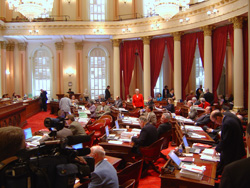Schwarzenegger's proposed budget poses stiff challenge to Democratic-led legislature

When Governor Schwarzenegger unveiled his revised 2010-2011 budget proposal last week, there were few surprises. With $3 billion less in projected tax revenue in April due to the recession, the state is now facing a $19.1 billion deficit.
To close this massive gap, the governor primarily is seeking draconian cuts to California’s programs that serve the poor, elderly and disabled, and additional cuts to state employee salaries and benefits. He is also looking to Washington to make good on its promises to the state as well as borrowing other state funds. Nowhere in the proposed budget is there an attempt to seriously raise revenue.
Specifically, the budget seeks $12.4 billion in spending cuts, $3.4 billion in federal money and $3.3 billion in various measures such as selling state office buildings.
Taking a huge hit are the 1.4 million poor Californians – 2/3 of which are children - enrolled in CalWORKS, the state’s “welfare to work” program. The governor is proposing a complete elimination of CalWORKS, leaving California as the only state in the nation without any kind of welfare to work programs. CalWORKS is primarily funded by the federal government ($3.7 billion) and is approximately 2.4 percent of the entire California budget.
Other cuts proposed are to the in-home care for the 430,000 elderly and disabled Californians, Medi-Cal and to the Healthy Families programs which provides health insurance to 700,000 low-income children in California. The governor is also seeking to eliminate child care subsidies for poor families, affecting another 142,000 children.
Other cuts proposed are a five percent salary reduction for all state employees, a 60 percent reduction in mental health services, and prison cost reductions.
On the other hand, spending on education funding will hold at its current level for K-12, community colleges and for the four-year university systems which includes restoring previously proposed cuts to US and CSU systems. The $140 million in funding cuts to the state parks will also be restored.
The only place the governor is looking to raise revenue is by trying to catch more people speeding with upgraded cameras at city and county intersections.
Outraged of course are Democrats who have declared the budget DOA. Citing the severe toll the recession has already taken on California families, particularly those who are poor and low-income, Democrats are dismayed that the governor plans to continue the corporate tax subsidies that are costing the state an estimated $2 billion per year.
Governor Schwarzenegger stated that his proposed budget “….. should be a reflection of what we in California value most, and what my administration stands for, in good times and in bad.”
Indeed. Let’s see if the Democratic-led legislature can do a better job of reflecting California’s values when they negotiate for a final budget.




